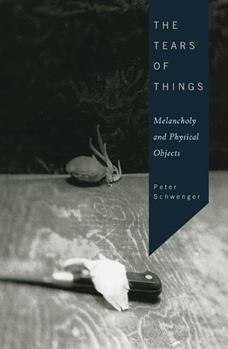The Tears of Things: Melancholy and Physical Objects
We surround ourselves with material things that are invested with memories but can only stand for what we have lost. Physical objects--such as one's own body--situate and define us; yet at the same time they are fundamentally indifferent to us. The melancholy of this rift is a rich source of inspiration for artists. Peter Schwenger deftly weaves together philosophical and psychoanalytical theory with artistic practice. Concerned in part with the act of collecting, The Tears of Things is itself a collection of exemplary art objects--literary and cultural attempts to control and possess things--including paintings by Georgia O'Keeffe and Ren? Magritte; sculpture by Louise Bourgeois and Marcel Duchamp; Joseph Cornell's boxes; Edward Gorey's graphic art; fiction by Virginia Woolf, Georges Perec, and Louise Erdrich; the hallucinatory encyclopedias of Jorge Luis Borges and Luigi Serafini; and the corpse photographs of Joel Peter Witkin. However, these representations of objects perpetually fall short of our aspirations. Schwenger examines what is left over--debris and waste--and asks what art can make of these. What emerges is not an art that reassembles but one that questions what it means to assemble in the first place. Contained in this catalog of waste is that ultimate still life, the cadaver, where the subject-object dichotomy receives its final ironic reconciliation. Peter Schwenger is professor of English at Mount St. Vincent University in Halifax, Nova Scotia. He is the author of Fantasm and Fiction: On Textual Envisioning, Letter Bomb: Nuclear Holocaust and the Exploding Word, and Phallic Critiques: Masculinity and Twentieth-Century Literature.
Format:Paperback
Language:English
ISBN:0816646317
ISBN13:9780816646319
Release Date:January 1
Publisher:University of Minnesota Press
Length:224 Pages
Weight:0.70 lbs.
Dimensions:0.5" x 6.1" x 8.9"
Customer Reviews
3 ratings
The Tears of thing: Melancholy and Physical objects
Published by Thriftbooks.com User , 15 years ago
As an artist contemplating making more stuff in a world full of stuff this book is excellent at looking at how we relate to objects. Very useful.
A beautiful treatise on melancholy
Published by Thriftbooks.com User , 17 years ago
I found Schwenger's model of melancholy, locating it in the tensile space between self and other, drawing on Freud and Lacan, to be utterly compelling and persuasive. I am an author who is writing academically for the first time about creating and I was very moved and inspired by this beautifully written, approachable book. From a personal point of view, being very interested in childhood poetics, I would have loved to have seen more attention paid to toys and Winnicott's concept of the transitional object in terms of melancholia, but I understand there are always limitations in any work. I do love the way Schwenger writes - it's a dream narrative in its own right.
essay on the inevitable distance between persons and the objects of their surroundings
Published by Thriftbooks.com User , 19 years ago
In his book-length essay with elements of philosophy, art criticism, and literary critique, Schwenger ruminates on the incompleteness of perception, "always falling short of full possession [as comprehension or understanding], giving rise to a melancholy that is felt by the subject and is ultimately for [italics in original] the subject." The author--a professor of English at Mount St. Vincent U. in Canada--detects the limits of the connection with things in a world of physical objects, including an individual's own body; which limits inevitably give rise to feeling of melancholy and loneliness. Art works of Georgia O'Keeffe and Rene Magritte, writings of Borges and Virginia Woolf, and sculpture by Duchamp and Louise Bourgeois are among the many and varied art by recognized modern artists the author brings in for his illumination of this mood of melancholy which is ordinarily faint in the hustle and bustle of daily life and its simple, practical relationship with things. One appreciates the author's unapologetic use of psychology in this sensitive movement in this central, yet for the most part unrealized feature of human existence. The psychology brings an illumination and reach to the subject which semantics, semiology, aesthetics, and the study of "material culture" cannot with their formalistic, postmodernist methods and styles. Schwenger finds in the end that although it is bound in with anxieties over "real and metaphysical death," since it is essentially a desire refusing "to conclude...always impelled past conclusion," melancholy is a part of the life force.






